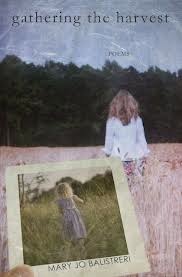Book Review
Mary Jo Balistreri, gathering the harvest, Bellowing Ark Press, 2012
Reviewed by Charles Portolano
When I sit down with a new collection of poetry, I want two events to happen:
I want the poems to provoke me to think beyond myself and I want to grow as a poet, and, possibly, if the poems are powerful, grow as a person. Balistreri’s new collection, gathering the harvest, far exceeded my expectations. Her poetry moves us to a greater understanding of ourselves and the world around us.
Let’s start our journey with the cover design by Chrys Heidel, which features a photo of a young girl with her back to us, walking through a field of wild grasses, and another photo above it of a woman with her back to us, walking through a similar landscape, letting us know this is a gathering of memories that a person collects from youth to middle age.
We first come to the fine, fine, poem “Gathering the Harvest,” which sets the stage for all the poems that follow. A couple is having a picnic, enjoying the day together, their time alone:
Your fingertips move lightly over my face as I linger,
suspended between here and there,
the heartbeats
of all the living and the dead, drumming within me.
The poem ends a few lines later with:
We scoop them up into the net of memory,
Winding back upon itself, moving forward.
Just wonderful how the poem has so many memories gathered over the course of a lifetime that allow us, the reader, to know that the poet has lived an examined life and has something to teach us.
“Saturday Matinee at the Lyceum on Superior Street” tells the tale of two 13-year-old girls watching Natalie Wood in Rebel Without a Cause, pretending they are as kissable as Natalie. The poem's last two lines:
Smoldering in yesterday’s ashes,
The secret suddenly leapt into flame
I won’t let on what happens, but these last lines allow us an insight into the beginning of puberty for a young woman.
Balistreri’s love of art, and her artist's eye, lead her to use three paintings by Edward Hopper as metaphors for the isolation and loneliness that Hopper painted of the 1930’s in America. The wonderful “Lisa Gheradini Sits for her Portrait” tells of the fascination between the artist, da Vinci, and his sitter, his Mona Lisa.
Desires, mine, his.
How that canvas yearns.
Balistreri gets us into the mind of Gheradini so we can better understand the mystery of this masterpiece.
Balistreri has a powerful ability to end her poems with perfect last lines, delivering a punch that knocks the reader out while uttering a “Wow.” “A Stillness Gathers in Autumn" ends with the line, "The silence that will hold us all," as the family waits by her Mother’s bedside for death to come take her. I read it again and again. “Sunset Over the Mill Pond” is a haunting poem about the ending of a day connected in the poet’s mind to the lives and deaths of her two grandsons. "So short these signals of love" says it all.
“My Prayer of Becoming,” that comes towards the end of the book, ends with the lines:
Unclamp my wings untether me
Like Pegasus let me soar
This is a poem for everyone to read. A poem about being human with all our faults, all our guilt, fears, and shame, so we can learn to live life as if today might be our last day.
The last lines of the book
We carry them forward even as they vanish
Into the blur of distance
Carry them with us
to another harvest
sums up its essence. The theme of looking back, looking forward, permeates this collection.The collection works on a visceral level, as well as on an intellectual level. I love its courage and grace and will visit these poems again and again.
Charles Portolano started writing poetry 16 years ago to celebrate the birth of his daring, darling, daughter Valerie and preserve the memories. Valerie was born with many obstacles to overcome giving him much to write about. Valerie is doing great now; she is quite the young writer. He has a new collection of poetry out, The little, lingering, white, lies we allow ourselves to live with.


